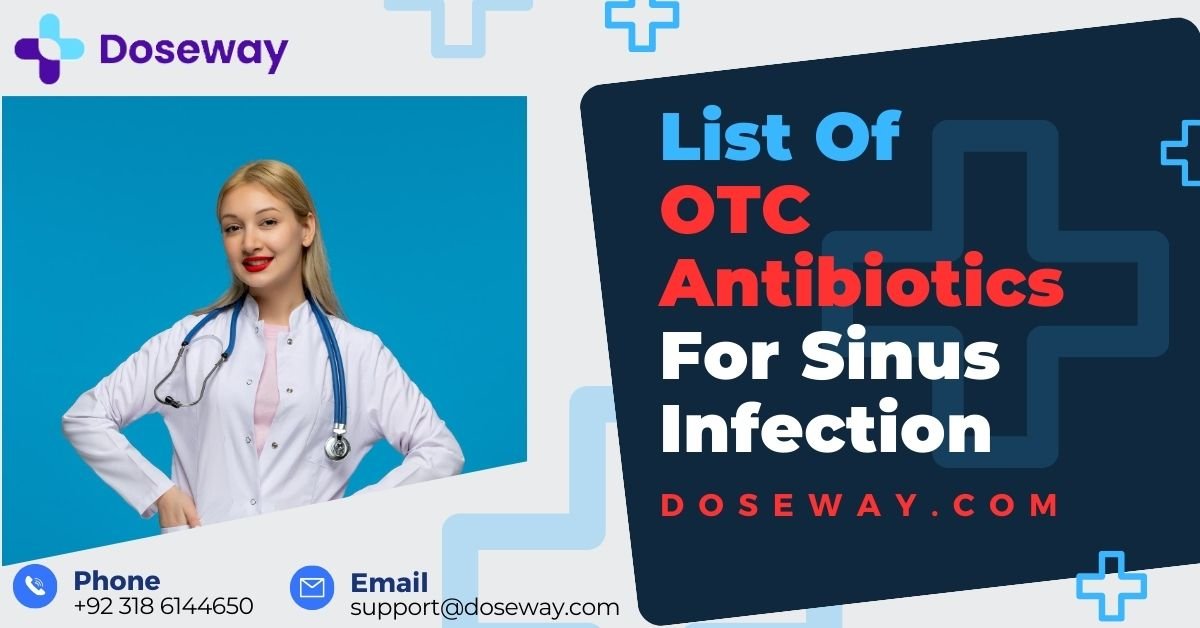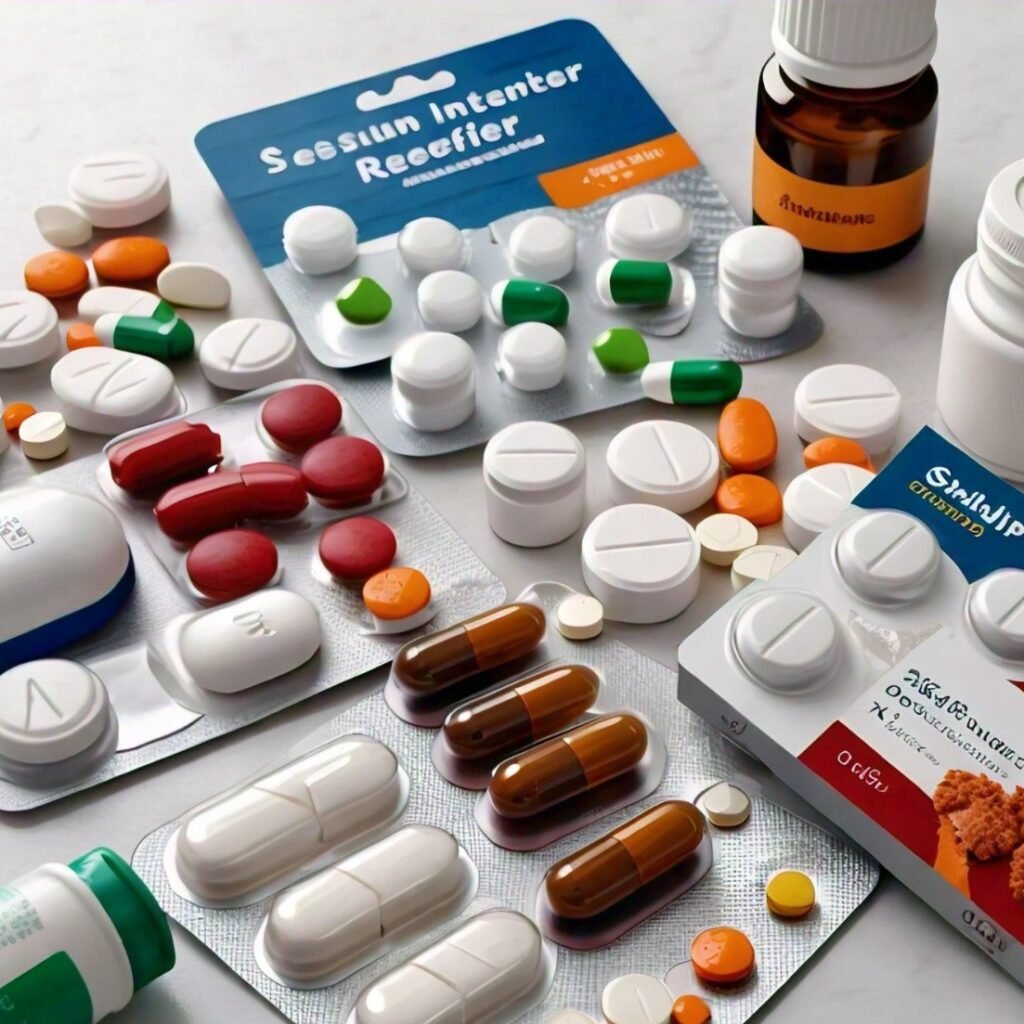Sinus infections, or sinusitis, are a common and debilitating condition affecting millions worldwide. The sinuses, air-filled cavities in the skull, become inflamed or infected, leading to congestion, pain, and discomfort.
Why Prompt Treatment Matters
Prompt treatment of sinus infections is crucial to prevent complications, such as:
- Chronic sinusitis
- Meningitis
- Eye infections (orbital cellulitis)
- Osteomyelitis (bone infection)
Sinus infections can be caused by:
| Cause | Description |
|---|---|
| Bacterial | Most common cause, typically Streptococcus pneumoniae, Haemophilus influenzae, or Moraxella catarrhalis |
| Viral | Usually caused by the common cold or flu viruses, such as rhinovirus or influenza virus |
| Fungal | Rare, typically affects people with compromised immune systems, caused by fungi like Aspergillus or Candida |
Recommended Readings:
- Best Antibiotic For Cough For Adults | Antibiotics For Cough And Cold
- List Of Strongest Antibiotics For Bacterial Infection | Antibiotics Tablets
- List Of Over The Counter Antibiotics | OTC Antibiotics
Best Antibiotic For Sinus Infection And Upper Respiratory Infection

Table Of Contents
What Is A Sinus Infection?
Definition: A sinus infection, or sinusitis, occurs when the paranasal sinuses become inflamed or infected, leading to pain, pressure, and congestion.

Types:
- Acute Sinusitis: A short-term infection, usually lasting less than 4 weeks
- Chronic Sinusitis: A long-term infection, lasting more than 12 weeks
- Recurrent Sinusitis: Repeated episodes of acute sinusitis
Common Symptoms:
| Symptom | Description |
|---|---|
| Nasal Congestion | Stuffy or blocked nose |
| Facial Pain | Pain, pressure, or tenderness in the face |
| Headache | Pain or pressure in the forehead, cheeks, or eyes |
| Yellow or Green Discharge | Thick, colored discharge from the nose |
| Cough | Coughing, which may worsen at night |
| Fatigue | Feeling tired or exhausted |
| Bad Breath | Unpleasant odor from the mouth |
| Sore Throat | Pain or discomfort in the throat |
Causes Of Sinus Infections
Bacterial Infections:
- Most common cause of acute sinusitis
- Usually caused by Streptococcus pneumoniae, Haemophilus influenzae, or Moraxella catarrhalis
Viral Infections:
- Typically caused by the common cold or flu viruses (e.g., rhinovirus, influenza virus)
- Often accompanied by a runny nose, cough, and fatigue
Allergies And Other Triggers:
- Allergies to dust, pollen, or other substances
- Environmental factors:
- Tobacco smoke
- Air pollution
- Changes in temperature or humidity
- Anatomical issues:
- Deviated septum
- Nasal polyps
- Enlarged adenoids
The Role of Antibiotics in Treating Sinus Infections
Bacterial vs. Viral Sinus Infections:
- Viral sinus infections: antibiotics are ineffective, and treatment focuses on symptom relief
- Bacterial sinus infections: require antibiotic treatment

When Are Antibiotics Needed?
Indications for Antibiotic Use:
- Persistent symptoms (lasting more than 7-10 days)
- Severe symptoms (high fever, facial pain, or swelling)
- Worsening symptoms
- Recurrent infections
When to Take Antibiotics for Sinus Infection?
- If symptoms suggest a bacterial infection (thick, yellow or green discharge, facial pain)
- If symptoms worsen or don’t improve with OTC medications
Common Prescription Antibiotics
Overview of Commonly Prescribed Antibiotics:
- Amoxicillin (Augmentin)
- Ciprofloxacin (Cipro)
- Clarithromycin (Biaxin)
- Levofloxacin (Levaquin)
Effectiveness of Antibiotics:
- Amoxicillin and Augmentin: effective against Streptococcus pneumoniae and Haemophilus influenzae
- Ciprofloxacin: effective against Pseudomonas aeruginosa, but less effective against Streptococcus pneumoniae
- Augmentin: effective against beta-lactamase-producing bacteria, making it a good option for recurrent infections
Addressing Common Questions:
- Is Ciprofloxacin Good for Sinus Infection? Ciprofloxacin can be effective, but its use is limited due to concerns about resistance and effectiveness against common sinus infection pathogens.
- Is Augmentin Good for Sinus Infection? Augmentin is a good option for sinus infections, especially those caused by beta-lactamase-producing bacteria, due to its broad-spectrum coverage.
Over The Counter (OTC) Options For Sinus Infection
Overview of OTC Treatments:
- Pain relievers (e.g., ibuprofen, acetaminophen)
- Decongestants (e.g., pseudoephedrine, phenylephrine)
- Antihistamines (e.g., loratadine, diphenhydramine)
- Nasal sprays (e.g., oxymetazoline, fluticasone)
- Expectorants (e.g., guaifenesin)

Can You Get Antibiotics Over The Counter?
Why Antibiotics Are Not Available OTC:
- Risk of antibiotic resistance
- Need for proper diagnosis and medical supervision
Alternatives to Antibiotics for OTC Sinus Infection Relief:
- Decongestants and antihistamines for symptom relief
- Nasal sprays for congestion and inflammation
- Expectorants for mucus thinning
Addressing “Over-the-Counter Antibiotics for Sinus Infection”:
- No antibiotics are available OTC for sinus infections
- Consult a doctor for proper diagnosis and treatment
Best OTC Medications For Sinus Infection Relief
Decongestants:
- Pseudoephedrine (Sudafed)
- Phenylephrine (Sudafed PE)
Antihistamines:
- Loratadine (Claritin)
- Diphenhydramine (Benadryl)
Nasal Sprays:
- Oxymetazoline (Afrin)
- Fluticasone (Flonase)
Pain Relievers:
- Acetaminophen (Tylenol)
- Ibuprofen (Advil, Motrin)
- Aspirin (Bayer)
- Naproxen (Aleve)
Expectorants:
- Guaifenesin (Mucinex)
- Expectorant combinations (Mucinex D, Robitussin)
Nasal Strips:
- Breathe Right Nasal Strips
- Nasal Ease Strips
Saline Nasal Sprays:
- Ocean Nasal Spray
- Simply Saline Nasal Spray
- Xlear Nasal Spray
Combination Products:
- DayQuil (acetaminophen, dextromethorphan, phenylephrine)
- NyQuil (acetaminophen, dextromethorphan, doxylamine)
- TheraFlu (acetaminophen, ibuprofen, phenylephrine)
Addressing “What Sinus Medicine Works Fast?” and “What Tablets Relieve Sinus?”:
- Decongestants and nasal sprays provide quick relief
- Antihistamines and expectorants offer longer-term benefits
Pain Relief Options
OTC Painkillers for Sinus Infection:
- Ibuprofen (Advil, Motrin)
- Acetaminophen (Tylenol)
Addressing “What Painkillers Are Best for Sinus Infection?”:
- Ibuprofen for anti-inflammatory effects
- Acetaminophen for pain relief without anti-inflammatory effects
Home Remedies And Natural Alternatives
Remember, while home remedies and natural alternatives can provide relief, they may not be enough to treat severe or persistent sinus infections. Always consult with a healthcare professional for proper diagnosis and treatment.

Steam Inhalation
- Boil water, then inhale steam for 5-10 minutes
- Add eucalyptus oil or menthol for added benefits
- Repeat 2-3 times a day to loosen mucus and ease congestion
Saline Nasal Irrigation
- Use a neti pot or squeeze bottle with saline solution
- Rinse nasal passages 2-3 times a day to clear mucus and debris
- Sterilize equipment and use distilled water to prevent infection
Hydration and Rest
- Drink plenty of fluids (water, herbal tea, soup) to thin mucus
- Aim for 8-10 hours of sleep to help your body fight infection
- Rest and avoid strenuous activities to reduce sinus pressure
Herbal Remedies and Supplements
- Echinacea: boosts immune system
- Garlic: antimicrobial properties
- Ginger: anti-inflammatory properties
- Turmeric: anti-inflammatory properties
- Omega-3 fatty acids: reduces inflammation
- Probiotics: supports gut health
Natural Alternatives To Antibiotics And OTC Meds:
- Try steam inhalation, saline irrigation, and hydration before resorting to medication
- Consider herbal remedies and supplements under the guidance of a healthcare professional
- Always consult with a doctor before using natural alternatives, especially if you have underlying medical conditions or take prescription medications.
Potential Risks And Considerations
Remember, you must consult a healthcare professional if you experience any warning signs or have concerns about your symptoms or treatment.

When To See A Doctor
Warning Signs:
- Worsening symptoms or no improvement after 7-10 days
- High fever (over 102°F) or chills
- Severe headache or facial pain
- Swelling or redness around the eyes
- Thick, yellow, or green nasal discharge
- Coughing up blood or rust-colored mucus
- Shortness of breath or difficulty breathing
Prolonged Symptoms and Chronic Sinusitis:
- Sinus infections lasting over 12 weeks may lead to chronic sinusitis
- Chronic sinusitis can cause permanent damage to the sinuses and surrounding tissues
Risks Of Self-Medication
Potential Side Effects of OTC Medications:
- Decongestants: insomnia, anxiety, increased blood pressure
- Antihistamines: drowsiness, dry mouth, urinary retention
- Pain relievers: stomach upset, liver damage (with excessive use)
Importance of Following Dosage Instructions:
- Always read and follow label instructions
- Do not exceed the recommended dosage or duration of use
- Consult a doctor before taking multiple medications or if you have underlying medical conditions
Antibiotic Resistance
Risks of Unnecessary Antibiotic Use:
- Contributes to antibiotic resistance
- This may lead to more severe infections or secondary infections
- Can cause allergic reactions or interact with other medications
Feeling Worse After Starting Antibiotics for Sinus Infection:
- This may indicate antibiotic resistance or a viral infection
- Consult a doctor if symptoms worsen or do not improve within 3-5 days of antibiotic treatment
Frequently Asked Questions (FAQs) – Antibiotics for Sinus Infection
What is the Best Pill for Sinus Infection?
The best pill for sinus infection is often a combination of a pain reliever (e.g., Acetaminophen or Ibuprofen) and a decongestant (e.g., Pseudoephedrine).
What is the First-Choice Antibiotic for Sinusitis?
Amoxicillin is often the first-choice antibiotic for sinusitis, as it effectively treats Streptococcus pneumoniae and Haemophilus influenzae, common causes of sinus infections.
Is Ciprofloxacin Good for Sinus Infection?
Ciprofloxacin is not typically recommended for sinus infections, as it’s more effective against bacterial infections like urinary tract infections and pneumonia.
What Tablets Relieve Sinus?
Tablets that relieve sinus symptoms include decongestants like Pseudoephedrine, antihistamines like Loratadine, and pain relievers like Acetaminophen or Ibuprofen.
What Painkillers are Best for Sinus Infection?
Acetaminophen (Tylenol) and Ibuprofen (Advil, Motrin) are effective painkillers for sinus infections.
Is Augmentin Good for Sinus Infection?
Augmentin (Amoxicillin-Clavulanate) is a good option for sinus infections, especially if beta-lactamase-producing bacteria cause the infection.
What Sinus Medicine Works Fast?
Decongestants like Pseudoephedrine and nasal sprays like Oxymetazoline work quickly to relieve sinus congestion.
How Long to Take Amoxicillin for Sinus Infection?
Typically, Amoxicillin is prescribed for 7-10 days to treat sinus infections.
Best Antibiotic for Sinus Infection Besides Amoxicillin?
Azithromycin and Augmentin are alternative antibiotics for sinus infections, depending on the severity and type of infection.
21 Day Antibiotic for Sinus Infection: Is It Necessary?
A 21-day antibiotic course is not typically necessary for sinus infections. Most infections are treated with a 7-10 day course. Longer treatment may be necessary for chronic or severe cases.
Can Sinus Infections Be Treated Without Antibiotics?
Yes, mild sinus infections can be treated without antibiotics using home remedies, over-the-counter medications, and nasal decongestants.
How Long Does It Take for Sinus Infection to Clear Up?
Most sinus infections clear up within 7-10 days with treatment. However, some cases may take up to 3 weeks to fully recover.
Can Sinus Infections Be Prevented?
Yes, sinus infections can be prevented by practicing good hygiene, avoiding allergens, staying hydrated, and managing stress.
Final Thoughts:
Managing sinus infections safely and effectively requires:
- Accurate diagnosis and treatment
- Responsible use of antibiotics
- Practicing good hygiene and self-care
- Staying informed and consulting a healthcare provider when needed
By following these guidelines, you can help alleviate symptoms, prevent complications, and promote optimal sinus health. Remember, if in doubt, consult a healthcare provider for personalized guidance and care.

 Cart is empty
Cart is empty
Add a Comment